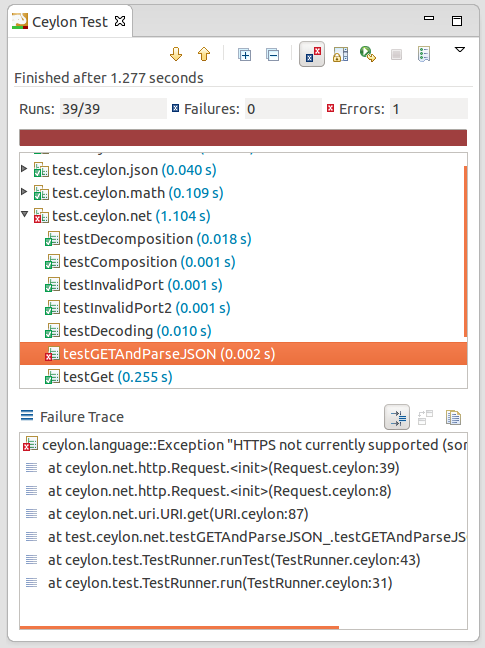First Ceylon Tour in Paris
The Ceylon team recently had its almost yearly face-to-face meeting in Paris. For those not familiar with how the Ceylon team works (and indeed how most of the open-source development teams work in Red Hat), the Ceylon team consists in surprisingly few individuals working remotely, and distributed world-wide. This includes not only developers such as me, paid by Red Hat to work full-time on Ceylon, but also the community of Ceylon enthusiasts who contribute time, code or discussions in their free time, without financial compensation other than the satisfaction of helping Ceylon be that much better that much sooner.
This means that yes, we do all work without seeing each other in person in most cases. Naturally, we communicate a lot in order to work together, but in our case that means via the Ceylon mailing list, or IRC channel, or via our issue tracker. We don't even do voice chats. This is pretty great for the Ceylon community, as 99% of our discussions are thus online and in the open and visible. I say 99% because there's always cases where there are some one-to-one discussions we have over private channels, especially when we want to prepare surprises :)
An interesting consequence of that is that we have met surprisingly few people of the team in person. A few of us met physically during conferences, others by being geographically close, and others yet during our previous face-to-face meeting two years ago in Barcelona, when we were very few. But overall, most of us had never seen each other in person, which is why we try to hold yearly face-to-faces.
The primary purpose of meeting together in my opinion is to have social interactions and talk about
something else than work for once. It also allows us to lock people in a room and prevent them from
going out before they've looked at something or given their opinion on something, which is something
that can't happen so easily when distributed. An example of that is when Loïc (one of our great
free-time contributors) came to present us ceylon.build and wanted our opinion, which we had
somewhat neglected to give previously, due to poor planning on our part.
We did also discuss things such as language features, roadmap and priorities, but those have already been reflected openly via our mailing list and issue tracker, where the discussion can continue.
The last (pretty big) advantage of being all together at the same place, was that we could take this opportunity to hold our first Ceylon Tour conference!
The first Ceylon Tour conference in Paris
Thanks to the guys from IRILL we were able to secure a very nice room to hold our first Ceylon conference, for free, where I'm glad to say lots of people showed up. We had people from from Slovenia, Germany and Austria, not to mention all over France and yes, even Paris. We were very surprised by the fact that people came from further than Paris, but it shows that Ceylon generates lots of interest.
We held the following talks during the morning :
Ceylon introduction
Ceylon idioms
Cayla and Vert.x in Ceylon
Ceylon SDK
ceylon.build
ceylon.test
Ceylon module repositories
Ceylon/Java interop
Ceylon workshop
And in the afternoon we had a great Ceylon workshop where people got to code in Ceylon, driven and helped by Gavin, and I'm glad to say that after 4 hours of workshop, most people were still not only awake, but engaged and coding, rather than just checking their email :)
The next Ceylon Tour?
All in all, we're very happy with the event, the content, the turnout and to answer the questions we got when we announced the first Ceylon Tour in Paris, yes we will try to plan another round in other locations, such as London, Berlin and the USA. If you think we should hold a Ceylon Tour event in your country/city, let us know and we'll happily discuss it.


